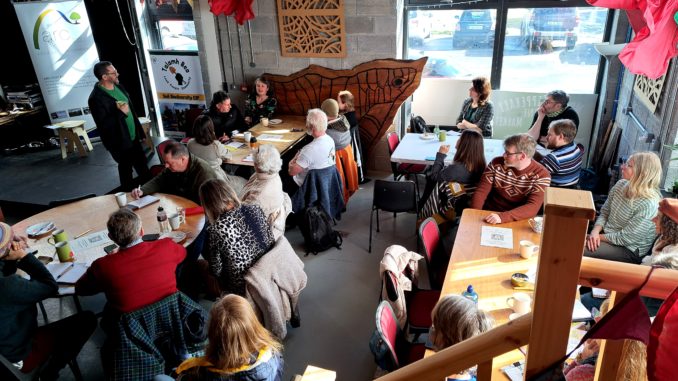
It’s good to be specific. It’s also good to be diverse. To be mixed and sometimes messy, to embed in a multiverse, a pluriverse, of things and people, of places and actions, of enabling infrastructure and strategic purpose. There is certainly a place in the world for doing one thing, and doing it well. But when it comes to making vibrant rural spaces, within our social and planetary boundaries, while living well, together…there’s a lot to be said for diversity too – in its many, myriad forms. Welcome to Feeding Ourselves 2023 – a diversity love story. Words by Oliver Moore.
Our Story Begins…
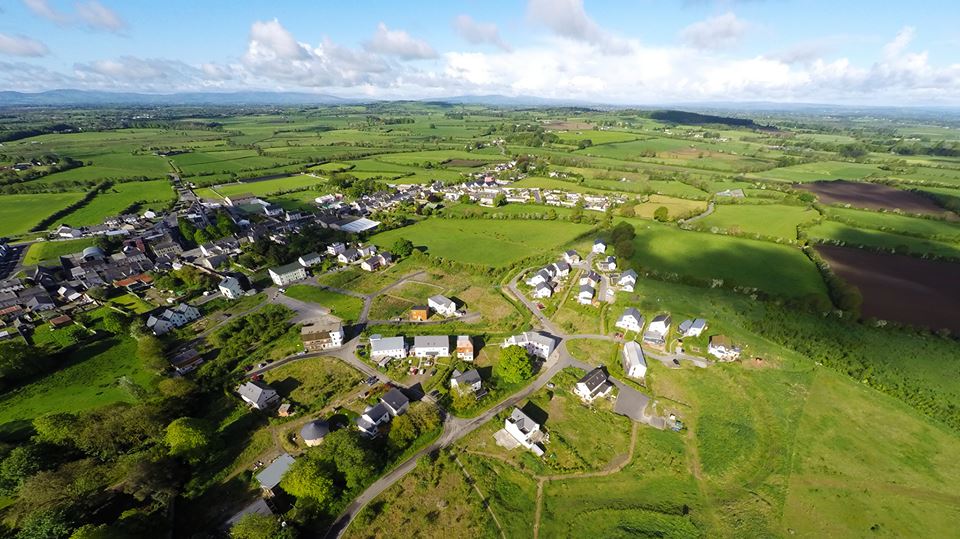
Feeding Ourselves as an event grew out of the Cloughjordan Community Farm (CCF). CCF had itself as a member owned and operated CSA – Community Supported Agriculture – initiative 13 years ago. Then, this farm, which itself emerged from a newly established ecovillage, wanted to tell the world about this new way to bring communities together around food, farming and environmental care.
This meeting many years back went very well (as you can read here) and Feeding Ourselves has since grown into an annual event.
In the early days it was all about food sovereignty, with technological sovereignty and more being added too. This was all done within a glocal framework: a cosmo local, globally engaged, solidarity economy paradigm.
Ireland’s iteration of La Via Campesina – Talamh Beo – emerged from this event. What’s more, in recent years, new elements and personnel have emerged. The Environmental Pillar – a representative group of Ireland’s environmental sector started to get involved in the policy discussions which were emerging as the event widened. Cultivate – a Cloughjordan based NGO focused on areas such as permaculture and rural resilience is a member of the IEN, and has been a co-organiser with CCF for some years.
This led to some feisty, but well informed exchanges between people quite used to their own comfort zones.
ARC2020 too started to get involved, creating a link between European rural and agri-food developments and Irish variations.
We were seeing ever more approaches and strategies come to Feeding Ourselves, but creativity exploded with the addition of the speakEATsy component – an event where food with a good story, performance poetry, local live music, a live documentary/interview segment, and Djs for dancing – brings people together via a multi sensory, physical and intellectual workout.
So, how did all of that work out last month in the Irish midlands? Here are five takeaways from Feeding Ourselves 2023, with a focus on its growing diversity.
A Growing Movement
Our potted history of Feeding Ourselves has already shown how wide and diverse it now is – more than a two day event, what’s recently emerged is a more robust network of people doing food, farming and rural places differently.
This is now both an annual event and a network of regenerative, agroecological farmers, people from co-ops, seed savers, food hubs, alternative distribution and rural activists.
Add to this the academics, the artists, those working with textiles and fibres, and you have quite the colourful collection.
Importantly, considerations of diversity and inclusion, of breaking down the barriers to women in farming, of hearing other voices from rural spaces and other cultures and approaches, featured too.
In a rural context of far-right co-option of local, organic, resilience messages, proudly bringing an even more colourful array of people, politics and pathways in was important to do.
Feeding Ourselves now has 20+ organisations involved, and also runs monthly check-ins, seminar courses and other supports.
From one CSA in the Irish midlands, it’s taken quite the journey.
Facts aren’t enough
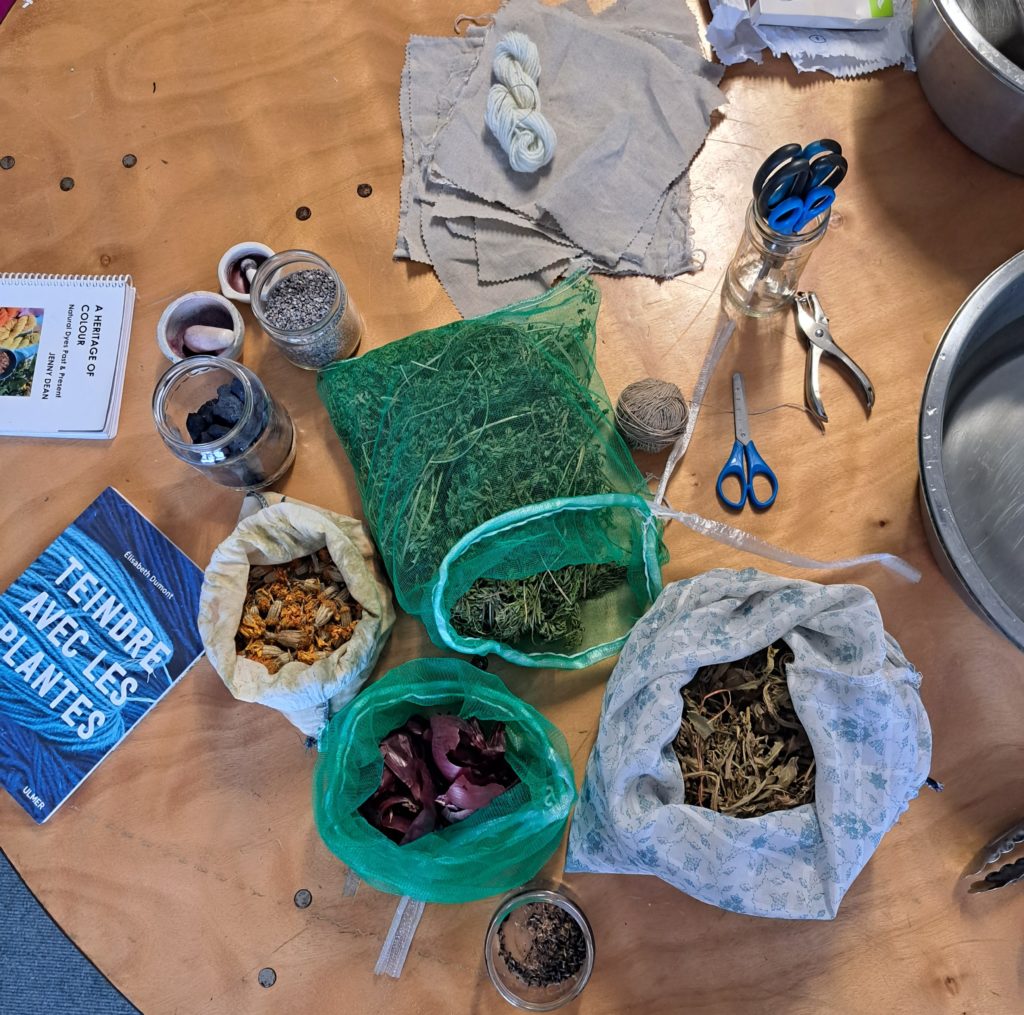
We’re not short of information. We are short of ways to reach people, to move them, to generate an emotional response and action. Different people learn in different ways – some in conversation, some through the practical and tactile, some through walks and talks.
Feeding Ourselves 23 brought comprehensive ways to engage with materials – from soil to sweater, in the case of the wool and natural plant dyes workshops – which tell a story about the right seeds, conditions, uses and synergies with other natural materials.
There was also powerful, mesmerising poetry, songs softly sung of birds and trees, the call of the disappearing curlew, and much fab food from the farm despite the time of year. Necessity breeds ingenuity, and there is an abundance sometimes in working with natural restraints.
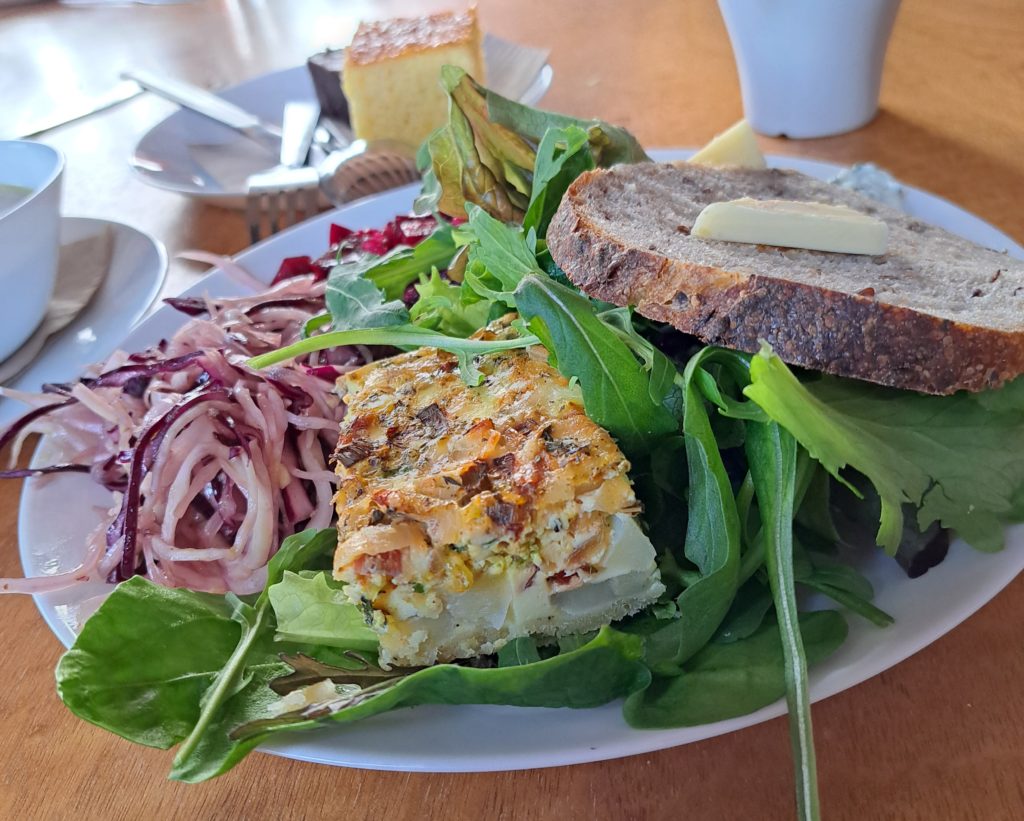
Following on from this…
It’s good to talk – and listen.
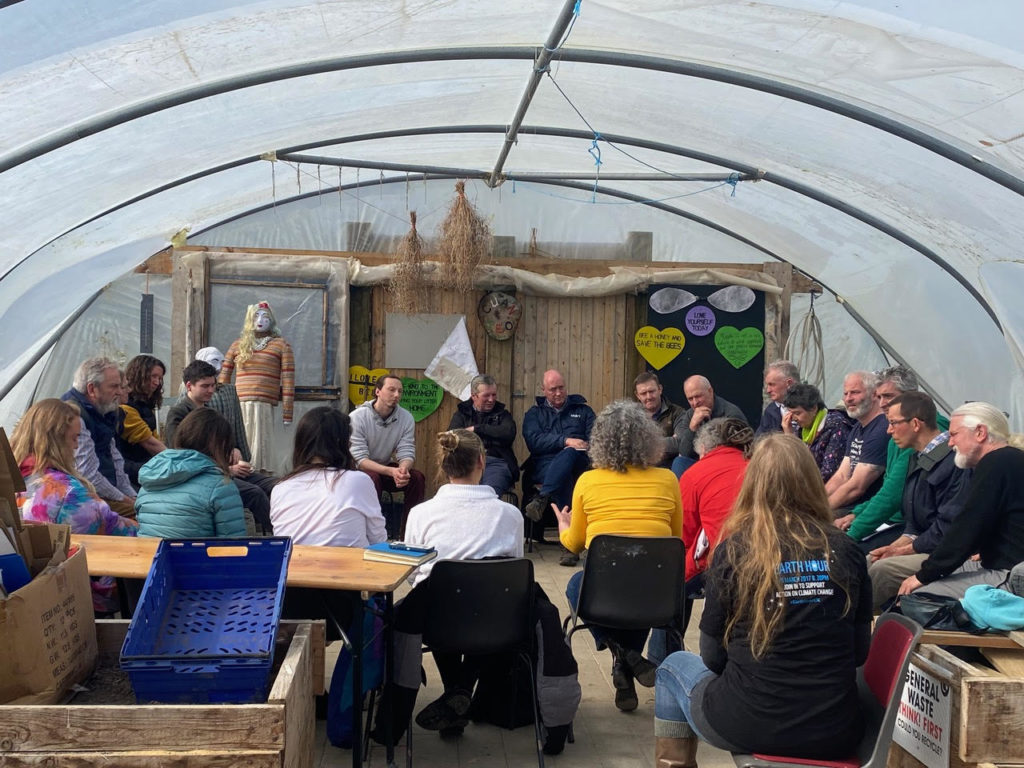
One of the new additions to Feeding Ourselves 2023 was a closed, Chatham House rules deep listening session between local conventional farmers, mostly dairy, and the rest of the Feeding Ourselves contingent.
People are often accused of preaching to the converted – as if choir practice isn’t a thing! Nevertheless these types of kindred spirit events can lack in providing diversity of other, disagreeing voices.
This deep listening session was carefully constructed and curated, to not be or become a debate, or an argument – there are plenty of spaces for that.
Instead, it was designed as a place for the regular Feeding Ourselves participants to properly listen, to try the time to better come to grips with the scale and gravity of change being asked of multi generation farmers on land of their parents and children. This was land worked hard, land that put their children through college, land that helped make Ireland a thriving economy.
This island was once an extractive colony, with emigration standard for decades. Since the economic crash of 2008, and the end of milk quota in 2015, Ireland has centred agri-food expansion and exports as core to growth and the economy.
And now, finally making money, dairy farmers have to grapple with coming restrictions on nitrates, with climate targets including agriculture, and with an uncertain future context of supports for transition.
The specifics of the conversation that unfolded will not be outlined here, as this was a closed session – but it’s good to talk, and moreso to listen, and especially to be seen to be listening ,live and in the flesh. This can be a powerfully arresting thing – a one way conversation, where the responsibility is on the talker.
For when dialogue gets polarised on social media, and people reinforce their ideas through memes, silos and occasional or concerted throwaway nastiness, showing people in real time that you are here to listen, to take your time, to take things on board, to let it sit and not just react – these are important, healing actions of the long distance runners of the Just Transition.
The specifics of this encounter will not be relayed here. But you could hear a pin drop at times. And it will be repeated.
Diversify Diversification
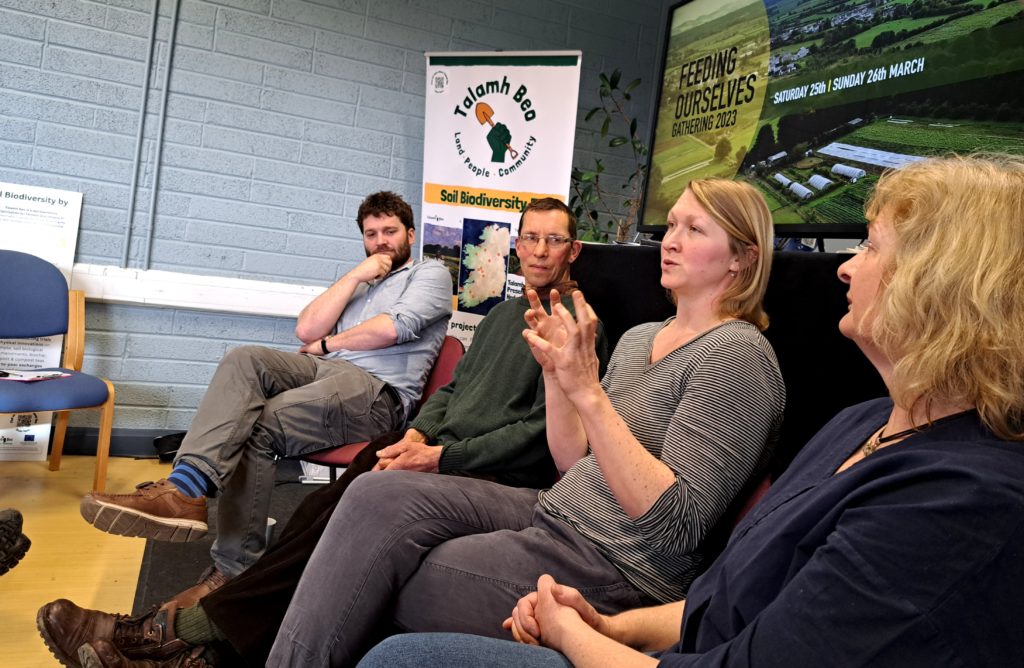
Mixed and other farming approaches can work for many sectors, However on-farm diversification can only do so much for a country with such a huge agri-food export sector. For dairy in particular, there are fewer fruitful ways for the 17,000 or so farmers in Ireland to adjust their practices without losing out financially – or being compensated for doing so.
Who will pay for this – up the value chain towards processors/co-ops retailers and eventually consumers, or across into CAP, other direct and indirect Just Transition funds – remains to be seen.
This will be the real, hard work of a Just Transition.
And yet, having done a session on Rural Europe Taking Action – inspired by the ARC and Forum Synergies Book of the same name – we heard from four farmers very close to Cloughjordan who were diversifying in very creative and imaginative ways.
Four Diversified Farmers in North Tipperary
Sean O Farrell (beef, poultry, pork, biodiversity, education, social farming)
Sean has a mixed farm up in Moneygall on the Tipperary Offaly, where he carries cattle (Angus Shorthorn Limousin cross), pigs (Duroc and saddleback) and chickens, finishing them all and selling as much via direct routes as possible.
A certified organic farmer, biodiversity is Sean’s superpower. His hedgerows are rightly famous, and a foundation for the school tours, wider educational programmes, social farming and other learning elements he brings onto the farm. Similarly, a large pond he put in has significant biodiversity benefits for Sean, who has a biodiversity degree from Trinity College Dublin.
Having a mixture of animals, organic management and strong biodiversity elements has allowed Sean to make his farm a place for nature and people to blossom.
Mimi Crawford (dairy, poultry, pork; regenerative agriculture and dairy direct selling)
Mimi and Owen Crawford operate as a micro-dairy on 28 acres, milking 12 cows and direct selling certified organic raw milk and other dairy products such as buttermilk, skim milk, butter and cream.
The Crawford’s pigs and chickens are integrated into the regenerative grazing system they operate, moving paddocks daily and sequencing the animals following each other on the land to maximise synergies.
“We strive to utilize each species’ niche to its fullest potential within the landscape, maximizing these niches on a farm-scale level. We sell everything directly to consumers and plant trees where we can. As part of Talamh Beo, we aim to create a holistic and self-contained system on our farm by promoting interactions between species both above and below ground.”
Ailbhe Gerard (sheep, forestry, honey, education/climate action)
Ailbhe has been farming since 2010, and is almost finished converting the entire farm to organic. The farm consists of ¼ broadleaf trees and a mixture of grazing land and tillage. “I have implemented stacked diversification by introducing sheep – a small flock of about 30 in total – and bees”.
She adds “raising bees has taught me enormous lessons about habitats and insects, and the farm has become a conservation site for a local bee species”.
Teaching in a third level agriculture college and running educational courses called “Field Exchange” adds to her income. In these courses, a range of people, including artists and designers, as well as various sustainability experts, come for open learning and doing days on the farm. A range of themes and practices have been explored in the first year. This has, she feels, worked well to encourage farmers to bring some biodiversity or sustianability elements into their own farms.
Maurice Deasey (cereals, heritage grains, on-farm brewery)
Maurice of Canvas Brewery carries cereal crops, including heritage crops, and sheep, has an on farm brewery and manages his own bottling, distribution and more.
The whole farm is in transition, “from conventional to conversation agriculture as conventional tillage is no longer profitable. As price takers, the grain market sets the price of our grain and inputs. Our plan is to farm and share-farm as three partners and rent other land.”
He adds :”I dislike the fact that world markets dictate our grain prices, so we have set a goal to brew beer and grow our own grain, hops, and water. Our objective is to reduce tillage and inputs. We are also considering organic farming because I believe it is possible to grow a good crop without tilling.”
The Pleasures and Pitfalls of Diversification
Maurice Deacy shows how necessity breeds ingenuity: “heritage grains are illegal to trade and so we malt our grain onsite. This is taxing on time. We are used to producing winter rye, winter wheat, spring barley, winter oats, but now want to add spring beans and peas, and all this requires different bays for storage. When crops mix then we also have to separate them. Having a big family helps.”
As often is the case, what interests you takes up more of your time, but this is what makes life and work more challenging “Small is beautiful, I spend much of my time tending to crops I find interesting which are less traditional. With interesting crops you have to pay attention to them. Knowledge on traditional crops is known intergenerationally, my dad would know how to tend to them. I spend a lot of time on interesting crops…I want seed diversity and for organic production I want disease resistant varieties and I want it to be good for human consumption. It has taken a lot of research to find these grains.”
For all four panelists, being able to reach out to others with similar values and approaches in related spheres was extremely helpful.
The Grain socials, run under the seed sovereignty Gaia seeds UK and Ireland initiative, is in many ways spearheaded by Maurise and Cloughjordan baker Joe Fitzmaurice of RiotRye bakehouse. This gathering and network, also held in Wecreate Cloughjordan, has been instrumental in helping bakers, brewers and especially cereal growers work together to drive on resilient farming and consumer tastes and choice.
Joe of Riot Rye spoke of sourcing and distributing ever more resilient produce, including grains from seeds originally sown on the land Mimi now farms. “It’s an exciting time for irish flour” he enthuses.
Businesses like his have distribution arrangements already sorted out, which can help others in the related food system – growers, makers, other producers.
Ailbhe Gerrard: “it’s amazing what networks can do. It’s amazing what bringing the energy of people together can do. Even if we did have to do everything, full supply chain process – growing, packaging, marketing, selling -, there is a lot there, but life is long and there are a lot of people there to help”.
Ailbhe has worked with all three of the farmers – or their parents in some cases. Diversified farmers do get complex – it’s a “massive leap” to go from being a farmer to a food producer, Mimi adds. These extra elements – different rules, different departments and agencies, supply chains and also being customer facing – don’t suit all farmers.
Interestingly, all producers except Maurice also sell on the North Tipperary Online Farmers Market (beer is more restricted regarding sales).
To be discussed
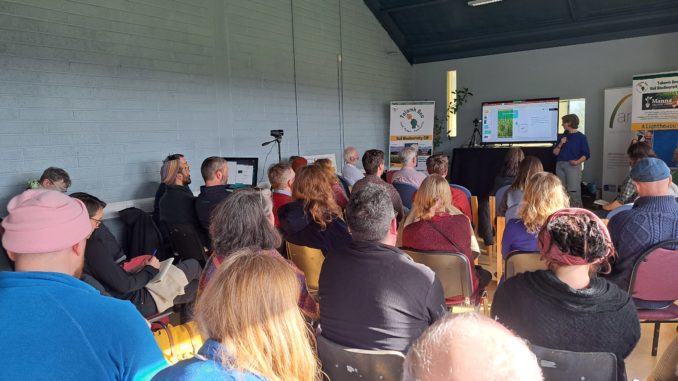
Discussion centred around the need for more adapted regulations, especially on seeds and on the rules for local provisioning; on the lack of apprenticeship schemes by European standards, in Ireland, and on consumer excitement at new foods like Irish flour emerging.
Much too was about synergies – building wood fired ovens for pizza’s made from heritage grains, working together in formal and informal networks, and the benefits of these participatory and multi stakeholder approaches all emerged conversationally.
The huge surge into the organic farming scheme in 2022 will have big implications, Mimi, Sean and Maurice all mentioned, and all for different reasons.
The Irish government finally started to support organics properly, with the result that in a single year, the numbers in the scheme have doubled. What does this mean for feed supply, processing (overly concentrated at the macro level; lack of certified organic compliant slaughterhouses in general) for markets – especially in beef and sheepmeat, where most of the new entrants are? Mandated levels of organic only public procurement was suggested as potentially successful (public procurement) with Denmark posited as a replicable model.
To Conclude
Rural Europe Takes Action webinar with Forum Synergies – full recording
There are many ways into trying to grapple with how we can make our farming, food, rural and environmental realities more resilient. Focusing in on four farmers – each within a few minutes drive of Cloughjordan – is just one way to start starting.
For even in the Irish midlands, where livestock dominates, we can eat and drink from the farms of very diversified producers. We can meet and greet them too, on their farms, at their open days, and even at our events.
Making these connections – breaking bread and bustin moves together – are important parts of building a new rural, resilient place. We need more diversity – on farms, off farm, of approaches to wicked problems and of peoples in all their styles.
The city-island of Cloughjordan ecovillage saw quite the diverse collection that weekend…here’s to many more.
More on Feeding Ourselves and Rural Resilience
Feeding Ourselves 2022 – Crises Compound, Food Sovereignty Movement Mobilises
Rural Ireland on the Move – new report on Just Transition and Diversification launched.
Cultivating The Future Together – ARC’s Rural Resilience Gathering in France
Rural Dialogues | The Three Conditions of Sustainable Rural Digitalisation
Ireland’s Our Rural Future – a rural digitisation gold standard?
Rural Dialogues | What are the 3 A’s of Feeding Ourselves in Ireland?




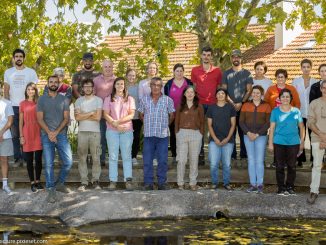
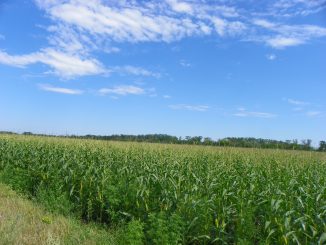
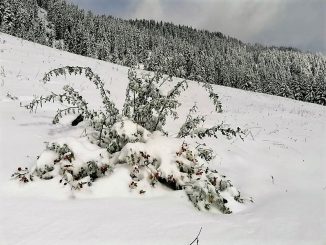
1 Trackback / Pingback
Comments are closed.